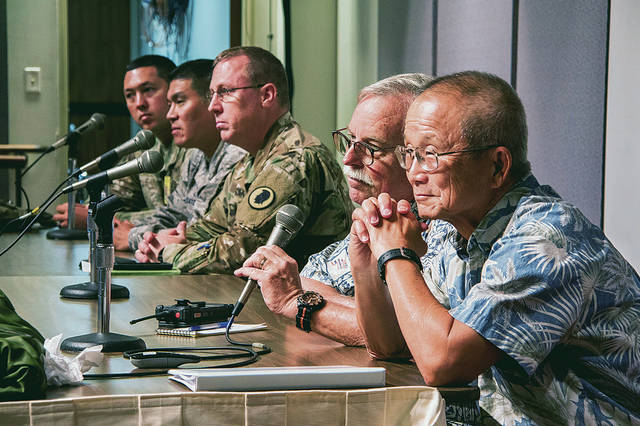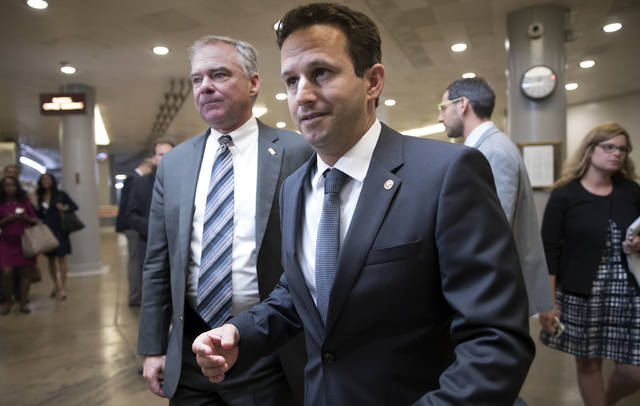HI-EMA ‘button pusher’ refusing to cooperate with FCC, internal investigators


STAR-ADVERTISER
Answering questions from the public during a panel discussion, on Sept. 21, were, from front to back, Vern Miyagi (Hawaii Emergency Management Agency (EMA)), Toby Claremont (Hawaii Exec. Officer for the EMA), Maj. Gen. Joe Logan (State Adjutant General and EMA Director), Lt. Col. Al Sato (93rd Weapons of Mass Destruction (WMD) Civil Support Team (CST) Commander), Capt. Sean Cripps (93rd WMD CST Nuclear Officer). The Hawaii Emergency Management Agency “button pusher” who sent a bogus missile alert that triggered panic across the islands on Jan. 13 is not cooperating with either a Federal Communications Commission investigation nor two internal investigations

ASSOCIATED PRESS
Sen. Brian Schatz, D-Hawaii, shown here with Sen. Tim Kaine, D-Va., at the Capitol in Washington in September, will host a Thursday morning hearing on emergency alert systems.



The Hawaii Emergency Management Agency “button pusher” who sent a bogus missile alert that triggered panic across the islands on Jan. 13 is not cooperating with either a Federal Communications Commission investigation nor two internal investigations.
“We are quite pleased with the level of cooperation we have received from the leadership of the Hawaii Emergency Management Agency thus far,” Lisa Fowlkes, the FCC’s Homeland Security Bureau chief, testified today at a Senate hearing on the missile alert incident. “We are disappointed, however, that one key employee, the person who transmitted the false alert, is refusing to cooperate with our investigation. We hope that person will reconsider.”
The FCC sent two investigators to Honolulu but got no cooperation from the HI-EMA employee, Fowlkes said.
The unidentified “warning officer” — an exempt, union employee — also is not cooperating with two internal HI-EMA investigations, one looking into the events of Jan. 13 and another probing the agency’s overall operations, according to Lt. Col. Chuck Anthony, spokesman for Hawaii’s Department of Defense, which overseas HI-EMA.
The employee has since been reassigned to an unspecified job at HI-EMA but has not returned to work since the incident, Anthony said.
The employee gave a written statement on Jan. 13 but is no longer cooperating, Anthony said.
Don't miss out on what's happening!
Stay in touch with breaking news, as it happens, conveniently in your email inbox. It's FREE!
“Initially he did provide a statement of his actions that day, but now he is not cooperating,” Anthony said. “He’s choosing not to have further engagement with other employees at the Emergency Management Agency who have attempted to reach out to him.”
The employee has not been disciplined but faces the possibility of punishment, which could include termination, Anthony said.
At the start of today’s hearing Opens in a new tab in Washington, D.C., before the Senate Communications, Technology, Innovation, and the Internet Subcommittee, U.S. Sen. Brian Schatz said he plans to introduce legislation giving the U.S. Departments of Defense and Homeland Security the responsibility to notify the public of an incoming missile attack instead of HI-EMA.
“A missile attack is federal,” Schatz said. “A missile attack is not a local responsibility. Confirmation and notification of something like a missile attack should reside with the agency that knows first and knows for sure, in other words the people who know should be the people who tell us. That is why I’m introducing legislation with Sens. Harris, Gardner and others to make it clear that the authority to send missile alerts should rest with the Department of Defense and Homeland Security. These agencies have to work with the state and local Emergency Management Agencies when they get the word out so that the public is safe and informed.
>> For the Honolulu Star-Advertiser’s full coverage of Hawaii’s missile alert scare, go to http://808ne.ws/Hawaiimissilescare Opens in a new tab.



